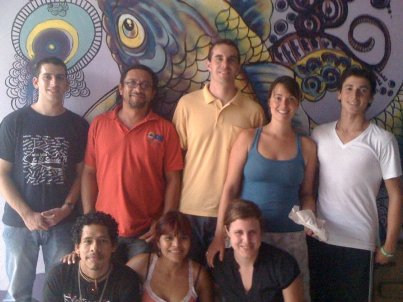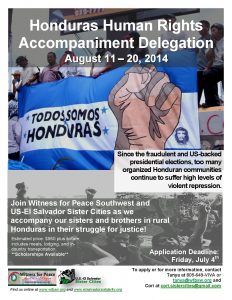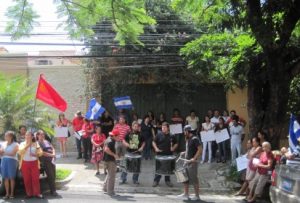Delegations, International Meddling, Sister Cities
Report from the Honduras Solidarity Delegation
-
Overview
On August 2nd, 3rd and 4th, 2010 members of the USESSC network and staff traveled to Tegucigalpa, Honduras to learn about the current situation one year after the coup and to make connections with Honduran organizations for future work. Michael Ring, Michael Ring-Martinez, Alexandra Early, Jan Morrill, Jesse Kates-Chinoy, Marianela Funes and Jesse Dyer-Stewart spent three days talking to different organizations and exploring ways USESSC can support the social justice work in Honduras and project it internationally.
-
Meeting Summaries
Arte en Acción
“Ser jóven es un pecado”-Sergia
Arte en Acción was started by 85 artists who came together to bring art and theatre to marginal communities affected by Hurricane Mitch. This first project was called Arte y Felicidad. In the beginning the focus of the organization was strengthening community organization through doing art with youth in marginal communities. As time went on some of the communities they worked with started to be controlled by gangs so the mission of the organization expanded to include art for the prevention of violence. Another focus of the workshops is teaching youth a culture of peace and increasing youth’s self esteem.
The facilitators of Arte en Acción are youth from the marginal communities the organization works in. They get trained and then go back to their communities and other regions to teach workshops in the areas that interest them.
Another unique part of Arte en Acción’s work is that they raise money for the organization through selling their services, like getting paid to play batucada or for theatre or musical performances at events. These profits provide partial support for their projects, which include a radio program about teenage sexuality, mural projects and doing work with youth in the southern region of the country around the theme of water and drought.
Since the coup Arte en Acción has had to walk a delicate line of being in solidarity with youth targeted and persecuted by police and trying not to offend their international donors. Members of Arte en Acción have attended marches against the coup but there is always a danger of being arrested and possibly tortured. The organization also created a theatre piece about the coup, despite warnings that it could make them into targets of golpistas. The representatives of Arte en Acción explained that since the coup the national view of youth has deteriorated and where before there were great efforts to reform the police all of that has now fallen apart. Since the coup approximately 40 youth have been accused of having connections with drugs and gangs and have been executed, and many of these youth were part of the Resistance movement. Nonetheless there are an enormous number of youth involved in the resistance movement even though there is a lot of fear and strong anti resistance messaging from the mainstream media.
In terms of solidarity, the folks at Arte en Acción suggested that while there is a lot of international cooperation there is a need for more international solidarity. They suggested that it would be good to have more concerts, theatre performances or events outside of Honduras to educate people about the effects of the coup.
COFADEH
“Los seis meses del golpe fue una escuela para todos”-Tomás
COFADEH started in 1988 with 16 families who came together to demand justice for their disappeared relatives. Noemi, one of the founders of COFADEH became involved along with her mother when her 19-year-old brother disappeared. In 1988 the Inter-American Court of Human Rights ruled against Honduras in the case of two kidnapped young people. The court ruled that the family receive monetary compensation for the loss. Nonetheless, the disappearances continued. During Zelaya’s presidency there was a Victims Reparations Decree passed and implemented to a certain degree. This resulted in an intense defamation campaign against both Zelaya and COFADEH. According to Neomi, things in Honduras are worse than they were in the ‘80s with an increasing number of tortured, kidnapped and disappeared people. COFADEH estimates that 160 young people have been physically attacked since the coup.
COFADEH has been doing a lot of work with youth in recent years. For the past four years they have been developing youth networks in four parts of the country with a focus on violence prevention and leadership development. Through their work in Tegucigalpa they have seen how youth are the victims of gang violence, police violence, domestic violence and abuse in their schools. While there is a youth policy law and a National Institute on Youth none of these structures actually work to defend the rights of young people in Honduras. Some of COFADEH projects include youth exchanges and a news blog written by youth called Defensores en Linea (www.defensoresenlinea.com).
COFADEH has been a key organization in the resistance movement. When a group of youth left the Brazilian Embassy in January, shortly after the coup, and were being followed by the police, they sought refuge in the COFADEH offices. While the police threw tear gas into the building they didn’t dare enter because of COFADEH’s high profile on a national and international level.
Plataforma Juvenil
“Estos jóvenes van a traer la transformación”- Javier
When we were at COFADEH the Plataforma Juvenil was meeting and agreed to speak with us about the situation of youth since the coup. The Plataforma Juvenil has been working since 2008 to be organization through which youth can demand their rights. Since the military take over in 2009 youth have been heavily targeted and persecuted by the government. In the wake of the coup, 29 LGBT youth were killed. Since then they estimate that 10 to 15 young people have been killed daily without any resulting investigations. The official explanation of the government is that these victims were tied to gangs, barras (soccer gangs) or drugs but there are similarities between how the victims are murdered that makes the members of the Plataforma suspect that the murdered are paramilitary groups or police. In most cases the youth have been arrested and released by the police just a few days prior to their murder. The Plataforma says that in spite of, and possibly as a result of, the repression and violence against youth, the movement is growing and more youth are participating.
The Plataforma sees its self as a mechanism for denouncing violence against youth committed by the coup government as well as a space for organizing to demand the implementation and adherence to the youth laws that are already officially on the books. They are also working against the privatization of education that is being pushed forward by the conservative government.
CPTRT
“Nosotros vamos a seguir a Zelaya, si Zelaya sigue la resistencia”– Member of the Resistence movement.
We spoke with Alba Mejia and Juan Almendares from the CPTRT, the Center for the Prevention, Treatment and Rehabiliation of the Victims of Torture and their Families, about effect of the coup on Central America and the role of the United States in supporting the Honduras Government.According to Mejia and Almendares, the stance of the U.S. government has been to deny that there was a coup and push for reconciliation. But as Almendrez said, “this is a country occupied militarily by the U.S. and it’s impossible that they didn’t know the coup was coming.” What the U.S. government and the golpistas didn’t expect was the spontaneous response of the Honduran people, who were previously thought to be passive and conformist. The takeover was intended to be a “golpe suave” but the government responded to the uprising of citizens with torture and disappearances. In the months right after the coup approximately 129 people were tortured a month.
Mejia and Almendares explained that since the coup the right wing has been pushing to open the country up to free trade and privatize public services. The U.S. has set up two more military bases in Honduras, 2 bases in Panama and 7 bases in Colombia. The government is also opening up the country so it can be taken advantage of what Almendares calls the military-agro-industrial-mining-energy complex. The coup has benefited multinational companies in these sectors which currently have at their disposition 30% of the national territory for their mining, bio-diesel, and hydroelectric energy projects, which they protect with their armies of private guards
The only possible silver lining in Honduras has been the formation of an unexpected, vibrant and diverse resistance movement. Almendares said that the construction of this social movement is almost more important that the actual work that it has achieved. U.S. solidarity with La Resistencia has mainly consisted of great outpourings of support from Hondurans in the U.S. Almendares and Mejia said that international solidarity could be improved through better communication, youth exchanges and more international denunciations of human rights abuses.
Discussion with COFADEH Director Bertha Oliva
“Si nos dejan solos en eso, nos van a dejar fritas y servidas.”-Bertha Oliva
COFADEH was created to defend human rights and for the no mas, to make sure that the disappearances and tortures that happened in the 1980s never happened again. Since the coup the human rights violations of the “80s are repeating themselves, with persecution, exile, torture, disappearances. What Oliva calls “the application of a systematic, silent elimination of dissidents”. A day before we met with Oliva, there was a protest at the Autonomous University of Honduras and police invaded the school supposedly to disperse protestors. Oliva pointed to this as an example of how bad the situation has become, explaining that the autonomy of the university was never violated during the ‘80s and arguinb that this invasion was not a sudden, unique incident but rather part of a systematic plan. Oliva argues that battleground at the university is one example of the main trends in Honduras, militarization, human rights abuses, the criminalization of protestors and the destruction of the environment.
Another problem is that since the coup there is no institution defending human rights. The undemocratically elected president created the Ministry of Human Rights in an effort to demonstrate the new government’s commitment to human rights. However, the human rights minister’s recommendations are consistently ignored. For example she recommended that the members of the teachers union, those protesting at the university, were in the right and that the fired teachers in question should get their jobs back. Even though these and other recommendations are ignored the human rights minister touts these recommendations on visits to other countries as proof of how humane the new government is. As Oliva says, it is all about selling an image of Honduras as a functional, democratic country. Meanwhile, COFADEH has received 1,200 complaints of human rights abuses, 15 people have sought exile outside of the country and 36 have had to move within the country. Despite the danger of doing social justice work in this context, Oliva says, “it is my obligation to be with the victims and right now the people of Honduras are the victims. I cannot be neutral. The defender of human rights who is not with her people when they are being massacred is no longer a defender of human rights.”
Oliva’s suggestions for improved El Salvador-Honduras and U.S.-Honduras solidarity is to create some kind of permanent accompaniment in the country. COFADEH is working on starting a commission on human rights through the Organization of American States which would have a permanent presence in Honduras. She says that outsiders are needed to document what is going on not just in the capital but in areas like Zacate Grande and Bajo Aguan where rural farmers are being murdered in defense of their right to land. Two organizations have responded to the call for permanent accompaniment. Both the Quixote Center and Ayuda en Acción are planning to have a permanent representative in Honduras.
-
Reflections
It became abundantly clear from our short visit that the news that is reaching the U.S. and other countries about the current government and repression in Honduras is vastly inadequate. The “application of a systematic, silent elimination of dissidents,” as Oliva calls it, is not what is being reported to the outside world and is much worse than many of us on the delegation realized prior to visit.
We were impressed by the very dynamic and diverse nature of the growing Honduran social movement which seems to encompassing many marginalized sectors of society, from youth to LGBT people to rural populations. The youth leadership and empowerment that the Honduran resistance has achieved is something that has been a challenge to the Salvadoran social movement. We were struck by the inclusive and creative youth organizing going on that defends not only young people’s rights, but also their values. Many youth-based programs in the Central America assume that young people have an intrinsic tendency toward drug abuse and crime if not distracted by something else like sports, scholarships, etc. In counterpoint, the youth of La Resistencia seemed to have emerged as leaders not because this distracts them from violent or illegal lifestyles but because of their inherent energy, dynamism, and fearlessness.
While specific organizations in the resistance movement have relationships with international solidarity organizations – for example the HSN coordinates with the FMLN- there still isn’t a consolidated strategy of how to work with and take advantage of international solidarity. One strength that CRIPDES and Sister Cities could bring to the table is our knowledge of how to start international solidarity and the different possibilities for support and accompaniment.
-
Next Steps
The group that visited Honduras is committed to looking for ways Sister Cities can support the work being done by the resistance movement in Honduras. We intend to bring a proposal of future collaboration to our entire network at our National Gathering in October in Cambridge, Massachusetts as well have future discussion with our partners ins CRIPDES. We hope that with the experience Sister Cities and CRIPDES have building networks of solidarity we will be able to find ways to extend that solidarity to the struggle in Honduras.



